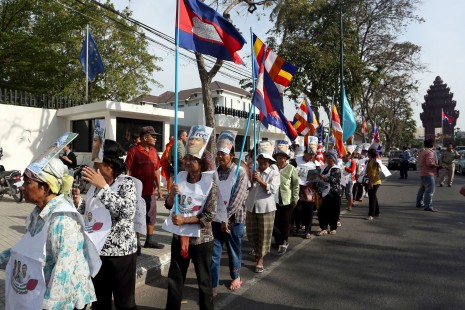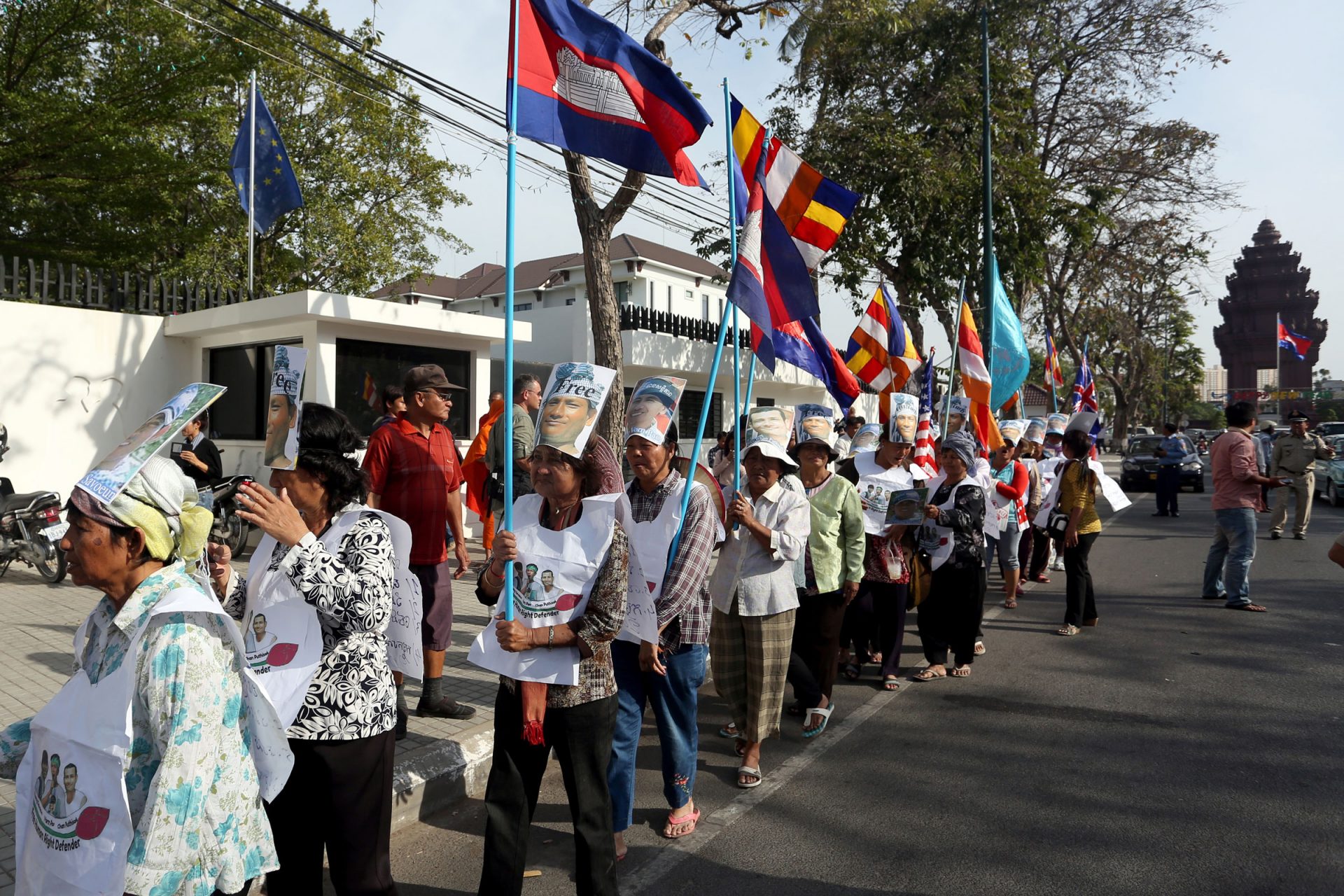Challenging the ban on demonstrations in Phnom Penh, activists rallied Friday at the U.S. Embassy, the Japanese Embassy, the Australian Embassy and the German Embassy before stopping for lunch and rallying again, in the afternoon, at the British Embassy, the European Union and World Bank offices, then marching, finally, to the South Korean Embassy to lobby for the release of protesters jailed earlier this month.
The peaceful, multi-embassy protest was organized by the well-known Boeng Kak housing rights activists, who submitted petitions at each diplomatic compound seeking international pressure to gain the release of 23 people rounded up by paratroopers and military police during the violent and lethal suppression of strike demonstrations in Phnom Penh on January 2 and 3.

“Please, embassy of the United States, help by intervening with the government to gain the release of Vorn Pao, Chan Puthisak, Theng Savoeun and 20 other people arrested by the authorities, and please also find justice for the people who were killed,” land rights activist Yorm Bopha shouted through a loudspeaker outside the embassy on Friday morning.
“The 23 people did not do anything wrong. If the government does not release them immediately, we will struggle, and we dare to sacrifice our lives for freedom and justice, even if the government uses guns to shoot us dead,” Ms. Bopha said as a couple of dozen protesters shouted slogans and waved flags representing the U.S., U.N. and E.U.
Transported to the maximum-security Correction Center 3 (CC3) prison in Kompong Cham province following their detention, none of the 23 has yet stood trial for the complaints lodged against them by authorities. Ten of the detainees were grabbed, several of them brutally beaten in the process, by paratroopers of the elite 911 airborne brigade who were deployed outside the Korean-owned Yakjin garment factory in the city’s Pur Senchey district on January 2.
The remaining 13 prisoners were arrested the next day following a bloody clash on Veng Sreng Street in Pur Senchey during which military police opened fire with AK-47 assault rifles against stone-throwing youths, killing five garment factory protesters and wounding more than 40 others.
A U.S. Embassy official accepted a petition letter at about 9 a.m. from the demonstrators, who then promptly took off in tuk-tuks and motorcycles for the Japanese Embassy where they again rallied with flags, loudspeakers and slogans before being allowed to enter the compound to submit their letter seeking Tokyo’s pressure on Phnom Penh to gain the release of the 23 prisoners.
At 9:40 a.m., and emboldened by their unobstructed protests despite the government issuing a ban on gatherings of 10 or more people, the demonstrators began to march to the Australian Embassy along Norodom Boulevard, followed closely by a dozen undercover police officers who furiously relayed information on their two-way radios about the unfolding events.
Submitting a petition to the Australians, the demonstrators then drove to the German Embassy on Street 214 where, after presenting their petition, and before breaking for lunch, protest leader Tep Vanny said that donor countries must finally speak up on behalf of ordinary Cambodians.
“These embassies, who are donor countries and who respect human rights, have influence, so they can help us in this case,” Ms. Vanny said. “Killing people is a cruel action. And, especially the soldiers of the 911 paratrooper brigade who used cruel violence against people. This is a serious abuse of human rights, and we condemn the illegal action of the government that only wants power and does not take care of the people.”
Taking to the streets again Friday afternoon, the protesters held similarly short rallies at the British Embassy, the E.U. and World Bank offices and the South Korean Embassy.
Taking part in the protests, Prak Sophannary, the wife of detainee Vorn Pao, who was brutally beaten and detained by paratroopers outside the Yakjin factory on January 2, questioned why her husband, who had a serious pre-existing health condition, had been jailed so far from his home.
“Why did they take him and put him in a prison so far away from Phnom Penh?” Ms. Sophannary asked, speaking outside the U.S. Embassy on Friday morning.
“If my husband’s health problem deteriorates mortally, I will condemn the government and I will file a complaint to the court.”
Human rights workers and lawyers visited the notorious CC3 on Friday amid swirling reports that bail was imminent for the 23 detainees and that prison paperwork had been readied for their release.
Yeng Virak, executive director of the Community Legal Education Center, said lawyers at the prison had “made their requests for pre-trial release.”
“We hope that they will be [released],” he said.
U.N. human rights envoy Surya Subedi, whose 10th mission to Cambodia wrapped up Friday, had also called for the detainees’ release on bail during a meeting with Prime Minister Hun Sen this week.
Phnom Penh Governor Pa Socheatvong accused the activists of being “professional protesters,” alleging that they were paid by unnamed agitators to conduct the embassy rallies.
“When they get paid, they hold a protest,” he said, declining to reveal whom he believed was the paymaster behind the activists.
(Additional reporting by Lauren Crothers)




